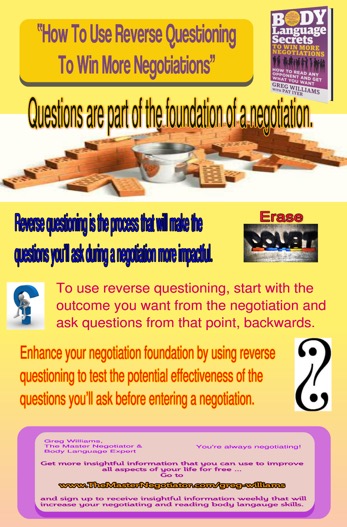How to Use Reverse Questioning to Win More Negotiations
How to Use Reverse Questioning to Win More Negotiations https://csuiteold.c-suitenetwork.com/advisors/wp-content/themes/csadvisore/images/empty/thumbnail.jpg 150 150 Greg Williams, MN, CSP https://secure.gravatar.com/avatar/1f08a50bcaed92eae0990a65c7808a62?s=96&d=mm&r=g
“The degree of success you experience in life and in negotiations is based to a degree on asking the right questions successfully.” -Greg Williams, The Master Negotiator & Body Language Expert
You no doubt know what reverse engineering is, right? Reverse questioning in a negotiation is the process of identifying the questions you need to ask in order to obtain the answers that will lead to a successful negotiation outcome. It’s also a way to identify how you’ll control the flow of the negotiation.
As a quick example, if you wanted to exit a negotiation paying $1,000 for a product you’d work from the outcome sought back to the beginning of the negotiation; you might also consider working back from that point to how you would position yourself prior to entering into the negotiation. To perform the latter, you’d assess the requirements needed (i.e. how you’d position yourself) to have your persona projected in a certain light/manner.
The following is what the step-by-step process would look like.
- Identify the most and least favorable outcome you’ll seek from the negotiation, along with why you’ve identified those points of juxtaposition. As a benefit, having that insight will help you identify exit points from the negotiation.
- Assemble a list of questions that might be asked of you as you would go through the negotiation.
- Create answers to the questions posed in step 2 that are needed to drive your efforts towards a winning negotiation outcome, while formulating questions you’ll ask to keep the negotiation on track; these will be your defensive questions. Identify points where you can answer a question with a question; remember, the person asking the questions is the person controlling the negotiation. That’s due to the fact, that person is gaining more information.
- Once you create and address step 3, create a list of questions that you might ask of the other negotiator that’s separate from the ones you might use to respond to his questions; these will become your offensive questions. Offensive questions are questions that move your negotiation efforts quicker towards the end of the negotiation; they are questions that the other negotiator has to agree with because they’re based on what he’s previously stated as his beliefs or truths; you’ll be weaponizing his thoughts and questions against him. Some of these questions will also come in the form of questions that answer questions.
- Assess how the opposing negotiator might respond to your scenario.
- Continue going over steps 1 through 5, in an attempt to uncover additional questions that you’d not considered that need to be included in the process.
- Once you feel you’ve honed the questions to a point that the other negotiator has to follow a prescribed path that you’ve created for the negotiation, test your hypothesis in a mock negotiation. This will allow your questioning process to become more refined and may uncover better/additional questions.
- Once you feel totally prepared to utilize your questions in a negotiation, do so. Engage with the confidence in knowing that you’ve created a stealthy way of capturing better information as you go throughout the negotiation.
- Save your questions in a repository to be used for comparison to past and future negotiation situations.
The wrong question asked at the right time in a negotiation may do incalculable harm. The wrong question asked at the wrong time in a negotiation may lead to a negotiation impasse. Create and test your questions before entering into a negotiation and you’ll have more of a chance to reach a successful negotiation outcome … and everything will be right with the world.
After reading this article, what are you thinking? I’d really like to know. Reach me at Greg@TheMasterNegotiator.com
To receive Greg’s free 5-minute video on reading body language or to sign up for the “Negotiation Tip of the Week” and the “Sunday Negotiation Insight” click here http://www.themasternegotiator.com/greg-williams/
Remember, you’re always negotiating.
#HowToNegotiateBetter #CSuite #TheMasterNegotiator #Bully #Question
#psychology

